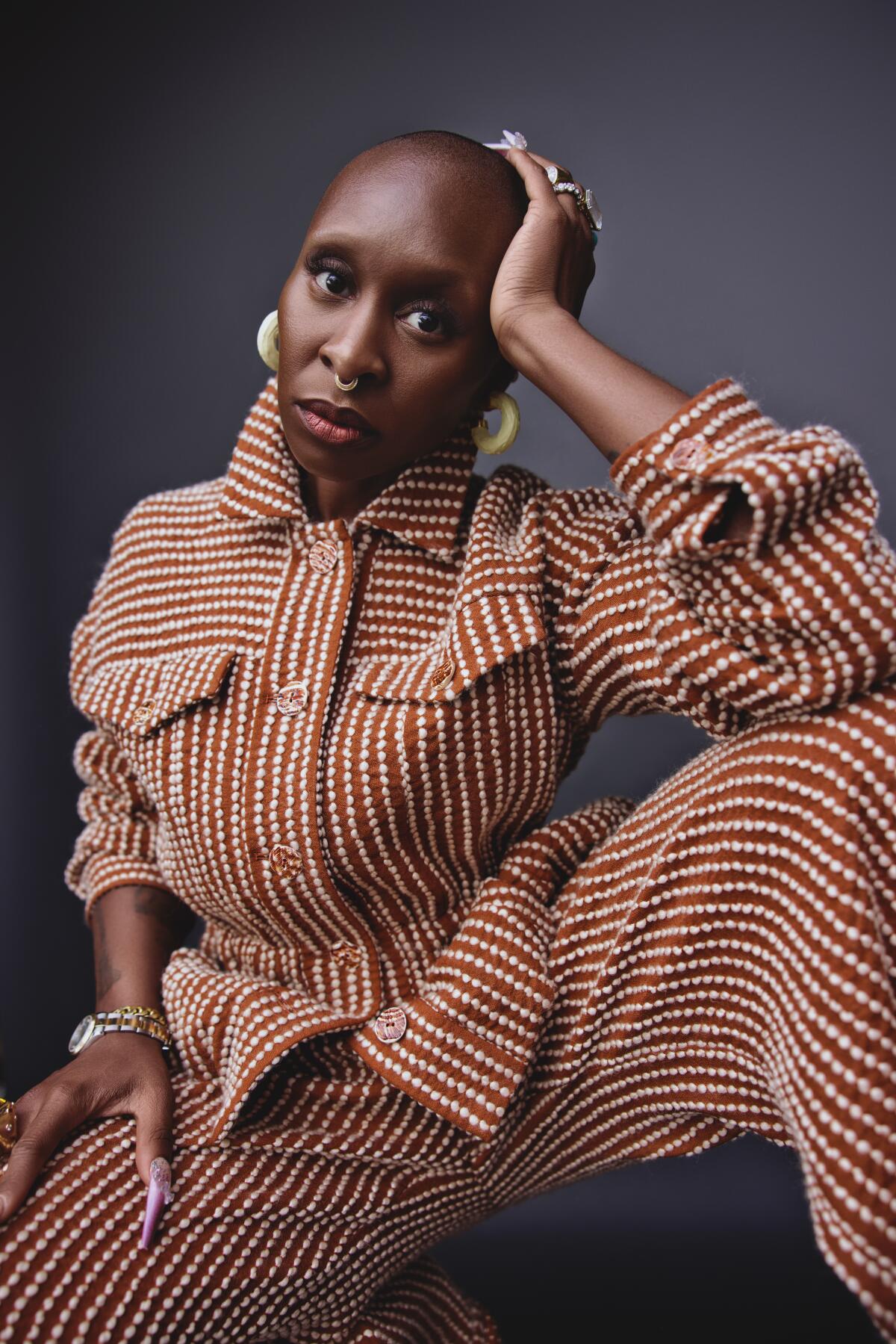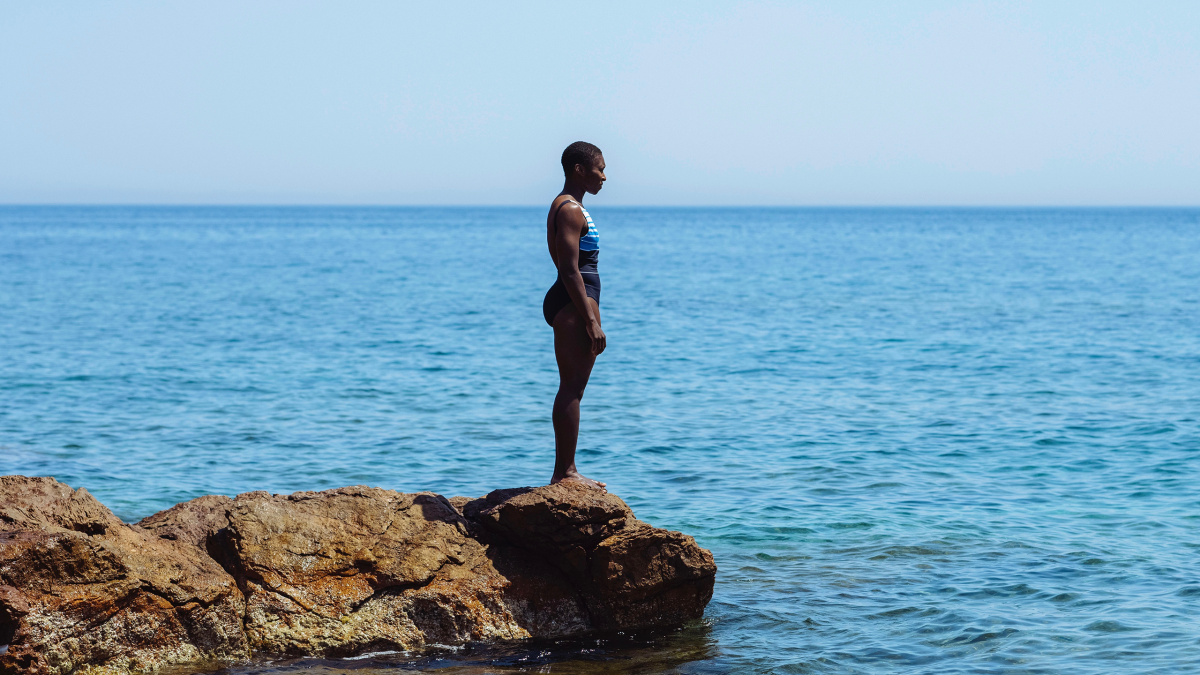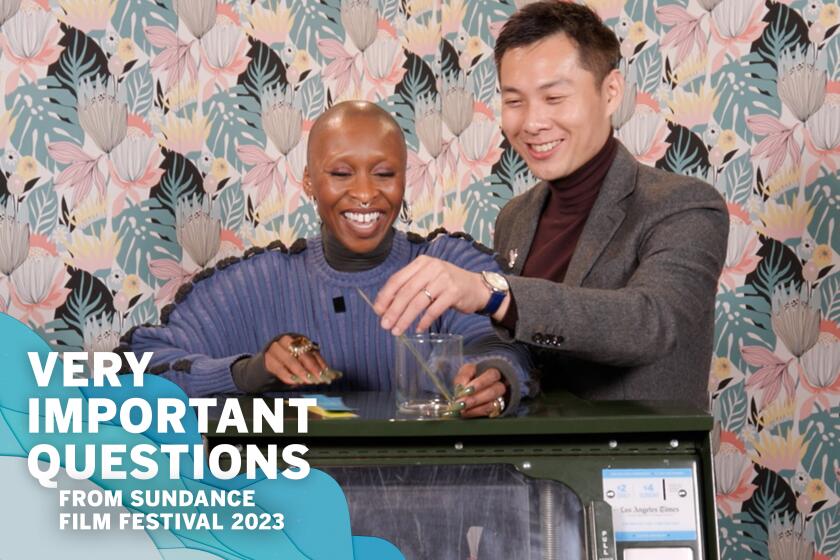How Cynthia Erivo gives her desperate trauma survivor in ‘Drift’ pride and dignity

- Share via
From when she first read a script for “Drift” in 2015, Cynthia Erivo committed herself to ensuring that this small-scale drama about self-exile, scars and healing get made. In other words, although the title speaks to the state of mind of her character, Jacqueline, a trauma-stricken refugee from war-torn Liberia on the margins of touristy Greece, it also reflects what the British-born Erivo wasn’t going to let happen to the project.
As her star rose, with Broadway fame (“The Color Purple”) leading to big movies (“Harriet”), she sought to involve herself beyond a lead part. By the time cameras rolled in 2022, Erivo was producing “Drift” through her new company, starring in it, and co-writing/singing its theme song (“It Would Be”). “It wasn’t made for very much money,” Erivo said earlier this fall over Zoom from New York, “but it was very much made of love and passion. I wasn’t letting it fall away.”
Who is the woman we meet at the beginning of “Drift,” the homeless, scrounging figure you play?
She just wants to make it to the next day. She’s deeply unsettled. There’s no particular focus. She’s not very still, because if she stays in one place for too long, it leaves a gap open for the memories to come flooding back.
Jacqueline’s memories are a parallel narrative seen in flashback, from happier times with family or in London while at school, up to the violence she fled. Did you talk to survivors of war?
My mother is one. I’ve spoken to her at length about what she’s gone through. She was in the Biafran war in Nigeria. I think she was 15 when it was happening. They were running a lot, trying to find food, and I just have this image of this young woman trying to survive every day. So there’s an instinct to survive but also to remain dignified. That’s the thing I really wanted for Jacqueline. Sometimes we find it hard to ask for help. We have our pride. I wanted desperately for whoever watched this to see Jacqueline as a human being first, someone who had hopes and dreams and fears like everybody else.
We’re in a fertile moment for movies about immigrants and refugees, people who find themselves in a limbo of displacement.
That’s something I really understood, the idea of being other and the same. Jacqueline doesn’t really fit in anywhere. She kind of fits in back home, but it’s very different because of her education. And in London, she speaks the language, but she’s not quite completely connected. Then she goes to Greece, and is completely disconnected from everything. This person is never going to feel truly at home until she lets go of the trouble she’s had to go through.
Was there a key physicality that helped you unlock Jacqueline?
I walked a lot, and in the constant movement, I sort of welcomed the fatigue. The tiredness I was feeling. It felt very visceral, that exhaustion.

Her relationship to water is also fascinating. She stares out at the Mediterranean, but she doesn’t want the tide to touch her. And yet taking a bath is what triggers her to vocalize her trauma to the American tour guide (Alia Shawkat) who befriends her.
There’s a disconnection between you and water when it’s a big old mass you see from far away. We know it both nourishes and cleanses, but it can look all-consuming. When Jacqueline looks at it, it’s life or death. Then this person comes along, talking to her, asking her questions, and so all the things are coming back to her. And with that bath, when she finally plucks up the courage to say, “I want to be clean,” [the water is] either going to swallow up all her feelings, or she’ll let them all out. That one choice.
What did you learn about yourself making “Drift”?
Sometimes the hardest of projects can be the most rewarding. I came away from this project believing art could really help, and that I’m willing to put myself through almost anything to tell the truest version of a story. Because in order to make it true, I had to believe it, to leave myself open to real, actual pain. And it was hard to separate what was real and what was not.
Has your mother seen it yet?
No. I will make sure she sees it, though. I think it might mean a lot to her.
Is it safe to say you read scripts differently now? That you’re looking not for a great part, but a worthy experience?
Absolutely. The holistic experience. And it changes the questions you ask. Not just, what’s the script like? But, who are we working with, where are we shooting, can I shadow the director, is there space for a producer? I want to be active. I’m annoying that way. I’m asking, how can I be of service to this particular project? I’ve always been a curious cat. And I think my curiosity will only expand.
More to Read
Sign up for The Envelope
Get exclusive awards season news, in-depth interviews and columnist Glenn Whipp’s must-read analysis straight to your inbox.
You may occasionally receive promotional content from the Los Angeles Times.











